Profiling In Complexity
- By Sharad Matade & Gaurav Nandi
- August 14, 2025
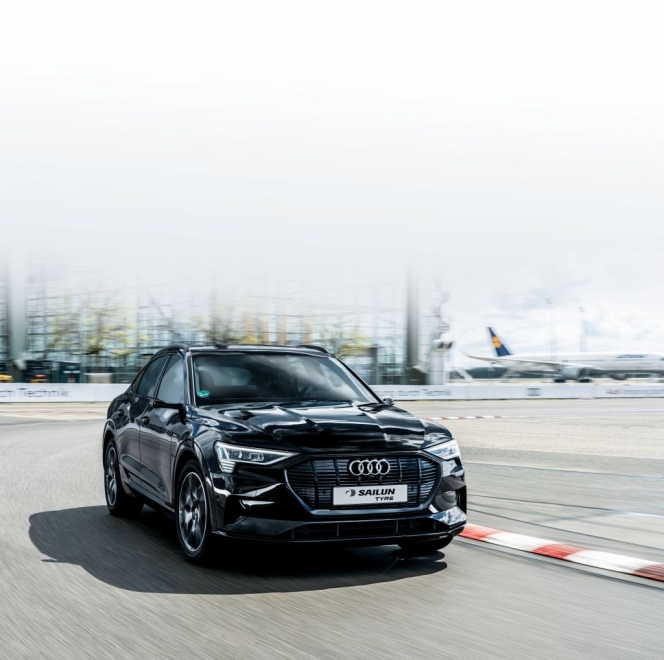
In Europe’s fragmented but fiercely profitable tyre market, success is hard-won and short-lived. The continent offers scale, premium pricing and OEM proximity, but it also throws up formidable barriers in the form of legal complexity, consumer conservatism and entrenched legacy players. While many Asian tyre makers continue to struggle for relevance, international Sailun Group has quietly rewritten that script. Combining academic roots, machinery expertise and agile ownership, it has grown into a global force. Now, with rising brand visibility, the company is challenging old assumptions.
Every tyre manufacturer from any nook and cranny of the world wants a piece of the European tyre market. The obvious reasons include higher profitability, consumer spending capacity and the lot. However, it’s easier said than done for entering such a varied and high-profile tyre economy. Tyre manufactures from many Asian countries continue the struggle to penetrate the European tyre scene. And some have been steadfast and persistent enough to have finally commenced operations running in the continent.
International tyre major Sailun Group is one such company that has its presence in the European market for the over a decade. Tyre Trends caught up with Sailun Tyre Europe’s Director of Marketing, Stephan Cimbal, at a recent expo.
He noted that the European market is one of the largest and arguably the most complex tyre markets in the world. It’s not a single market but rather 40 individual ones, each with its own language, regulations and consumer behaviour.
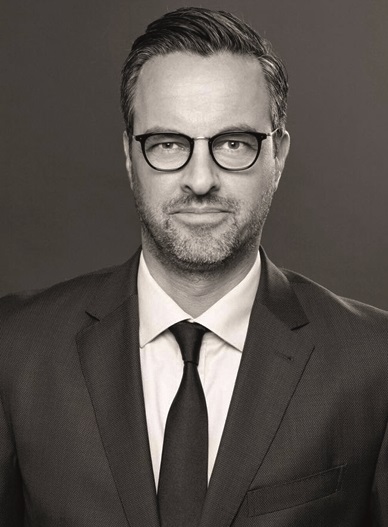 “Despite its fragmentation, Europe remains one of the most profitable regions thanks to its high price levels and concentration of major original equipment manufacturers. If you can succeed in Europe, chances are you’ll find success in other global markets as well,” he added.
“Despite its fragmentation, Europe remains one of the most profitable regions thanks to its high price levels and concentration of major original equipment manufacturers. If you can succeed in Europe, chances are you’ll find success in other global markets as well,” he added.
When Sailun Tyre Europe began its European journey just over a decade ago, few in the industry could have predicted how swiftly the brand would rise. According to the executive, it ranks among the 10 most valuable tyre brands in the world today.
Cimbal recalls the group’s roots with quiet pride. “It all began a little more than 20 years ago in Qingdao, China. We were founded out of the Qingdao University of Science and Technology, a think tank for rubber technology with 30,000 students and 4,000 faculty members doing nothing but research on rubber,” he explained.
That academic foundation proved crucial. Sailun Group’s founder Yuan Zhongxue still is also a university professor whose role has always been to turn scientific research into real-world industrial solutions. One of his earliest achievements was the establishment of a machinery company, now known as Mesnac, which went on to become a major force in tyre manufacturing equipment.
A few years later, Sailun was born, initially, to serve China’s domestic market. “Success came quickly. The tyres were well received and demand just kept growing,” noted Cimbal.
That early success at home soon gave rise to ambition abroad. After a successful foray into North America, a relatively straightforward market by comparison due to its unified legislation, Sailun Group turned its sights on Europe.
“It was maybe 12 or 13 years ago when we entered Europe. We started the usual way by partnering with local distributors, shipping containers, building the brand from the ground up. The approach worked. For nearly a decade, we quietly expanded our footprint, growing year on year. Then, almost suddenly, the brand recognition soared. We started to appear in the top 10 of European tyre magazines. That was unimaginable just a few years ago,” Cimbal recalled.
The executive noted that currently its European operations are expanding. While the traditional import-distribution model continues to thrive, the group is now actively exploring original equipment partnerships and deeper regional integration with its partners.
Alluding to how did a relatively young company muscle its way into a fiercely competitive, brand-driven industry, Cimbal noted, “It was a combination of entrepreneurial ownership, cutting-edge technology and a deep-rooted respect for branding. We are privately owned. That means we can move fast. We also benefit from Mesnac’s machinery expertise and the scientific horsepower of our university roots. We take the brand very seriously. For us, it’s more than a name, it’s a mindset, a promise.”
STAYING COMPETITIVE
As the European tyre market shifts towards premiumisation and larger tyres with higher margins, many established brands are closing plants that once made smaller-size products. The move reflects a strategy to reduce volume while increasing profitability with a focus on 18-inch and above sizes.
Yet, Sailun Tyre Europe sees the market differently. “We don’t believe small cars or small tyres will vanish in a year or two. People will still use them for years and we see that as an opportunity,” said Cimbal.
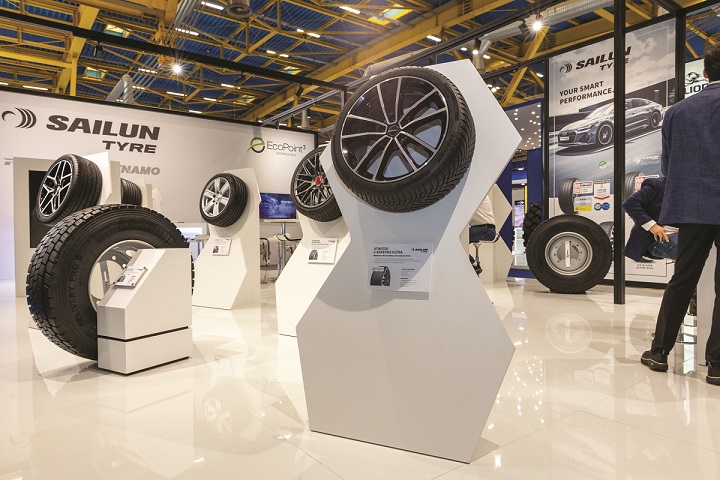
The company positions itself as a full-range manufacturer. “We do tyres for small cars, medium cars, big cars, trucks, excavators, tractors etc. If an established brand sells at a price index of 100 and we offer similar performance at 70 or 75, it gives the consumer a sense of making a smart choice. They feel like they got the same quality for less; it’s a psychological win,” noted Cimbal.
Sustainability is another pillar of the company’s strategy. With modern factories, including its latest plant in Cambodia, which is just 18 months old, Sailun Tyre Europe can not only claim sustainability but also prove it. “That’s especially important for original equipment customers. If your sustainability processes aren’t in place, they won’t even talk to you,” said Cimbal.
While the manufacturer offers tyres across all segments, the strongest volumes remain in passenger cars. However, the company highlights its strength in truck tyres, citing nearly a decade of proven quality and performance. Its off-the-road tyre brand has also seen strong uptake in agriculture and construction, where reliability and brand trust are critical.
“It’s not about being cheap. We aim to be more affordable than traditional brands but still offer a high-value, reliable product. That’s attractive to farmers, construction firms and mining operators alike,” the spokesperson added.
On the evolving trend of tyres-as-a-service, the company isn’t actively engaged yet.
MARKETS IN VIEW
While the group has seen success in both North America and Europe, the two markets are vastly different in structure, regulation and consumer behaviour.
“In North America, the market is dominated by maybe five to 10 major wholesalers. In Europe, you’re dealing with hundreds. The difference isn’t just about distribution; it goes to the heart of how tyres are sold, marketed and perceived,” explained Cimbal.
Vehicle diversity plays a role too. “In North America, you generally see a lot of big trucks and a strong budget segment. But in Europe, the car types vary hugely. The complexity doesn’t end there. With 15 to 17 separate national regulations governing things like winter and summer tyres, the European landscape is a maze of legal requirements. The complexity of Europe is pretty unique,” added Cimbal.
Branding adds yet another layer as European consumers are heavily influenced by brands. They’re premium-oriented, very technology-conscious and pay close attention to the look, feel and messaging of a brand.
This awareness has shaped how Sailun Tyre Europe presents itself as it tries to appear smart, clean and modern.
Becoming a global brand is no simple task particularly for a company rooted in China. Commenting on how the group achieved this feat, Cimbal said, “It’s a tough, long journey from being a local brand in China to becoming a global one. You need a global framework, but you must also adapt the brand to local markets. European consumers don’t care what your brand looks like in China or the US; they want something that speaks to them directly.”
BRANDING EDGE
Back in the 1970s, Chinese manufacturers were often just copying European designs and not always doing it well, noted Cimbal. But that changed quickly. They moved from simply imitating to matching quality levels and then very rapidly to improving on them, doing it better, faster and cheaper. That’s the real secret behind the success.
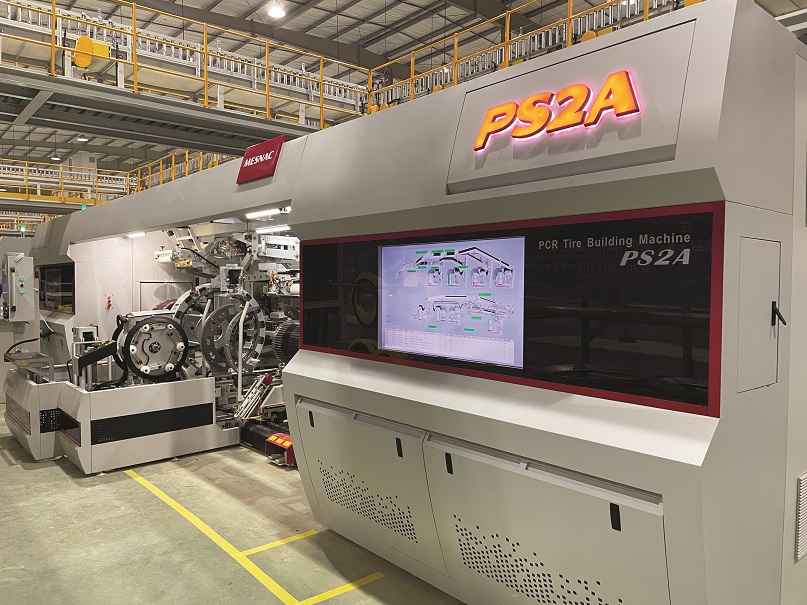
According to him, it’s China’s ability to learn quickly and apply those lessons at scale that underpins its industrial momentum. In the tyre sector, evolution has brought performance, reliability and competitive pricing to global markets. But as the industry matures, product quality alone is no longer enough.
“Tyres are a branding game. The quality is there but others also make good tyres. For most consumers, all tyres look the same. That is why brand strategy is becoming critical for Chinese firms. Unless you’re a race driver or a tyre expert, you can’t easily tell one tyre from another. So brand becomes the key differentiator. It’s a shift already playing out in the automotive world and tyre makers will need to follow suit. We think we have the right tools and experience to manage it,” he contended.
As Chinese tyre manufacturers move from replication to innovation, a quiet transformation is underway. Across the board, Chinese manufacturers are no longer aiming to match European standards but working to surpass them.
This shift, Cimbal believes, is already beginning to reshape how Chinese-made products are viewed, particularly by younger consumers. “The next generation is growing up with products that are simply ‘Made in China’. They don’t question the quality. That label doesn’t carry the same doubts it used to,” he noted.
And in this high-speed race, brand perception could be just as critical as performance.
GEO-POLITICS AND SUPPLY
With a growing global footprint and an increasingly agile supply chain, Sailun Group is navigating a complex mix of political, economic and industry-specific challenges.
The group currently operates ten manufacturing plants in China along with facilities in Cambodia, Vietnam, Indonesia and Mexico, and a European plant is on the horizon, though the timeline remains uncertain.
The move to diversify production isn’t just political but strategic. As the European Union considers new anti-dumping tariffs on Chinese tyre imports, many Asian companies, including Sailun Group, are shifting capacity abroad. “You have to decentralise anyway for economic reasons. Now, with the threat of protective tariffs, it just makes even more sense. But it’s not a new strategy. The solutions are already in place,” explained Cimbal.
Despite growing geo-political friction, the company retains a high level of logistical flexibility. It can shift sourcing and supply routes quickly as needed.
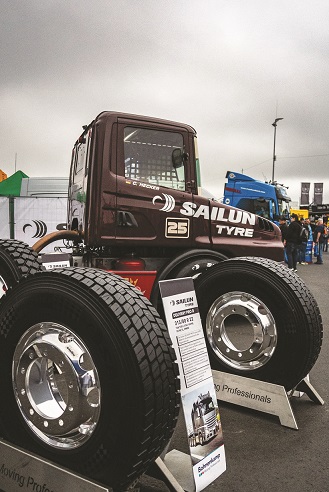 In terms of product strategy, Sailun Tyre Europe remains committed to a balanced focus on both passenger car radial and truck and bus radial segments.
In terms of product strategy, Sailun Tyre Europe remains committed to a balanced focus on both passenger car radial and truck and bus radial segments.
Surprisingly, the current economic downturn with inflation and cost-of-living pressures in regions like North America may actually benefit the brand. “We offer near-premium performance at a lower price. For consumers tightening their budgets, that’s a compelling proposition,” noted Cimbal.
However, the tyre business remains layered with challenges. The industry, still largely traditional, is digitally underdeveloped. While tyres can be purchased online, the need for physical installation adds complexity but also presents upselling opportunities at dealerships and tyre outlets.
“Competition is among the most pressing concerns. The market is overcrowded with dozens of brands. Many of them are weak and some may vanish but no one is waiting for a new entrant. Earning a foothold requires a fight,” said Cimbal.
In a saturated European market, where demand has plateaued, the company sees growth through aggressive expansion. While legacy European manufacturers defend ageing infrastructure and close plants, Sailun Tyre Europe is building, growing and taking market share.
Commenting on the future of collaboration between companies, Cimbal noted, “There are simply too many brands and manufacturers in the market today. That can’t continue indefinitely. We will see more collaborations and mergers.”
As for growth, the company reports a sharp upward trajectory. “It depends on the market, but overall, we’ve seen a decent year-on-year growth. In some mature markets, even one digit is a big win. Elsewhere, higher two digits growth is possible, though those markets tend to be smaller. So it’s complex to quantify in a single figure,” contended Cimbal.
KraussMaffei Technologies Appoints Dirk Musser As New Managing Director
- By TT News
- February 27, 2026
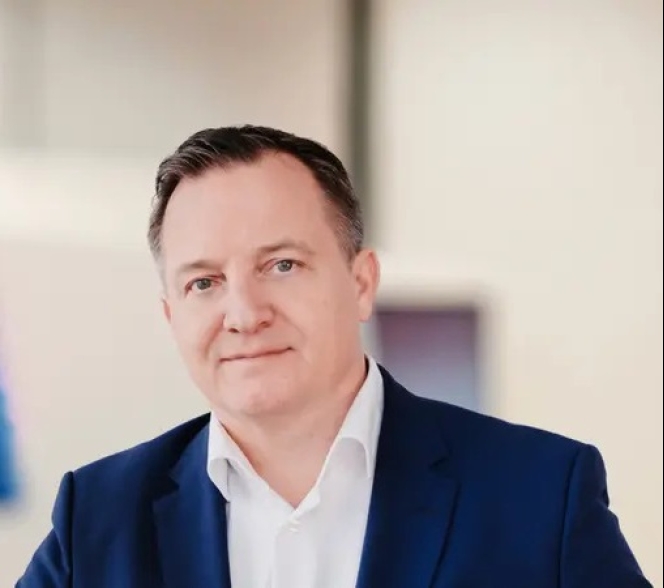
KraussMaffei Group is set to implement a leadership transition at its subsidiary, KraussMaffei Technologies, with a change at the board level. Jörg Stech, who has served as Chairman of the Board and global head of injection moulding, automation and additive manufacturing since 2023, will be departing on 31 March 2026 at his own request. He will be succeeded by Dirk Musser, the current Head of Group Transformation at the parent company, who has been appointed as the new Managing Director effective 1 April 2026. The leadership handover between Stech and Musser is already in progress, ensuring a seamless transition.
Stech’s tenure unfolded during a difficult economic period marked by financial losses and a contracting market. He responded with decisive measures aimed at margin enhancement and balance sheet improvement, which laid the groundwork for the company's long-term stability. Under his direction, the product lineup for injection moulding and automation was revitalised with the introduction of the LRXplus linear robot, the fully electric PX series and the MC7 control system, all launched in late 2025 alongside new artificial intelligence tools. He also launched a multi-year development initiative and pushed the company into new markets, such as aerospace and drone technology, by leveraging expertise in specialised processes like ColorForm. Through a focus on operational excellence, pricing discipline and capital efficiency, Stech guided the company to a significantly more resilient position compared to three years prior, despite the persistent downturn in injection moulding.
Musser brings to his new role extensive experience in transformation and finance. In his current capacity, he has already been closely involved with KraussMaffei Technologies, collaborating with its leadership to drive strategic initiatives and enhance operational performance. His qualifications include sharp analytical abilities, a strong grasp of industrial processes and a broad international perspective. An economist by training, Musser has accumulated over 20 years of leadership experience across various technology and industrial sectors. His background includes leading major transformation and turnaround projects at CRRC New Material Technologies, where he stabilised plant earnings in North America, as well as directing operational and financial restructurings during his time at Deloitte. He has also held roles with P&L responsibility, managing global supply chains and post-merger integrations at CRONIMET and has prior experience with automotive manufacturers including Daimler and Fujian Benz Automotive in China.
Alex Li, CEO, KraussMaffei Group, said, "Jörg Stech took on responsibility in a difficult situation, set clear priorities and launched decisive initiatives. The successful market launch of the LRXplus linear robot and the all-electric PX machine series, the consistent focus on profitability and the sustainable strengthening of our balance sheet are visible results of this work. We would like to express our sincere thanks to Jörg Stech for his leadership, integrity and team spirit. We value Dirk Musser as a leader who combines strategic clarity with operational excellence. In a short period of time, he has provided vital impetus for the transformation of the group and impresses with his analytical strength, decisiveness and deep understanding of our processes – not least through his successful collaboration with the managing directors of KraussMaffei Technologies. We are convinced that he will continue on this path with clarity and creative drive to successfully align KraussMaffei Technologies."
Stech said, "After many years in an environment full of technological, economic and geopolitical challenges, I look back with great gratitude on a time in which I was always surrounded by an exceptional workforce. Together, we achieved things that many initially thought were impossible. This cooperation, this willingness to push boundaries and create something new, was a joy for me. My special thanks go to all stakeholders in the company and, of course, to all employees. I leave with respect, gratitude and the conviction that this long-established company will continue to achieve great things in the future."
Musser said, "Together with my fellow managing directors Dr Frank Szimmat and Markus Bauer, I want to resolutely drive forward the further development of KraussMaffei Technologies. Our focus is on further expanding stability and performance and taking the necessary steps to successfully position the company in a dynamic market environment. I look forward to shaping this path together with our teams.”
Dario Marrafuschi Succeeds Mario Isola As Pirelli’s Head Of Motorsport
- By TT News
- February 27, 2026
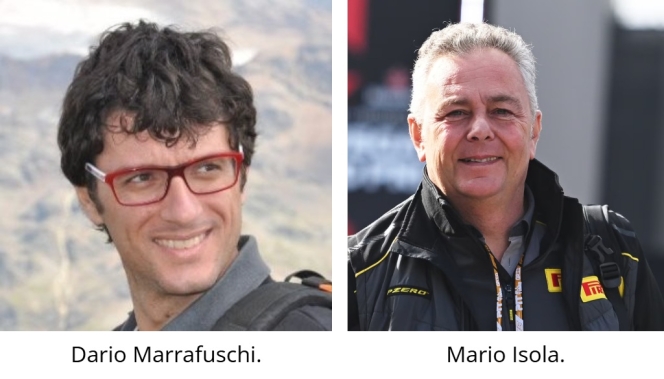
Italian tyre manufacturer Pirelli has announced that Dario Marrafuschi will become the Head of its Motorsport Business Unit, effective 1 March. He succeeds Mario Isola, who will remain with the company until 1 July to assist with the leadership transition.
Marrafuschi joined Pirelli in 2008 and has held positions within the Formula 1 Research and Development department. Most recently, he led the development of the company's road products.
He will report to Giovanni Tronchetti Provera, Executive Vice-President of Sustainability, New Mobility & Motorsport. The appointment comes as the company continues its role as the tyre supplier for various global motorsport categories.
Isola departs the company following a tenure that included the expansion of Pirelli’s motorsport operations. The company stated that Isola will pursue other professional opportunities following his departure in July.
Changing Tyre Dynamics In A Changing Car Market
- By Sharad Matade
- February 27, 2026
For Continental Tires India, the passenger vehicle market in India is entering a phase where scale and structure are finally aligning with its longstanding premium ambitions. Passenger vehicle sales reached a record 4.3 million units in 2024, expanding by 4–5 percent year on year, but it is the composition of that growth – rather than the headline volume – that is reshaping the company’s strategy. Utility vehicles now account for approximately 58 percent of total passenger vehicle sales, up sharply from about 51 percent the previous year, cementing SUVs and crossovers as the dominant force in the market.
This structural shift has direct consequences for tyre manufacturers operating at the upper end of the value spectrum. Larger vehicles bring higher kerb weights, bigger wheel diameters and greater expectations around refinement, safety and performance. For Continental, the change represents not merely an increase in addressable demand but a decisive move towards tyre categories where technology differentiation and pricing discipline can coexist.
Samir Gupta, Managing Director of Continental Tires India, calls this phase a turning point, not a temporary high. He says the surge in utility vehicles – driven by electrification and more premium cars – fundamentally changes the economics of the passenger tyre market in India.
“Let me clarify one thing first. The utility vehicle segment is no longer small. Last year, around 60 percent of passenger vehicles sold in India were utility vehicles, and including first-time buyers upgrading within this segment, the share goes beyond 65 percent,” Gupta says.
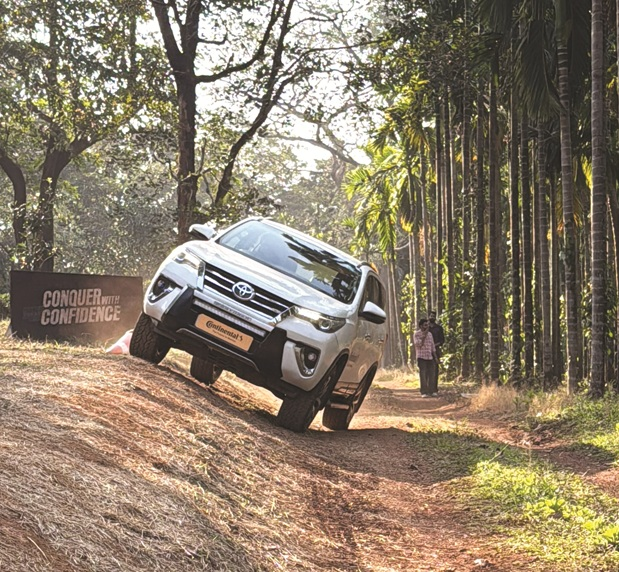
Industry data broadly supports this assessment. SUVs alone contributed close to three-fifths of all passenger vehicle sales in 2024, with compact utility vehicles accounting for a significant share of incremental volumes. The overall passenger vehicle market, at around 4.3 million units, has thus become structurally skewed towards larger formats – an inflection with long-term implications for tyre sizing, load ratings and product mix.
This shift shows in replacement demand. As vehicle footprints grow, rim diameters are increasing. “The market is clearly moving from smaller to bigger rim sizes. Demand for 17-inch and above tyres is rising sharply,” Gupta says. While these tyres are still a minority, their growth far outpaces the overall passenger tyre market.
Electrification is accelerating the shift. A substantial proportion of electric passenger vehicles sold in India today are SUVs, and Continental expects EVs to account for more than 50 percent of the passenger vehicle segment within five years. For tyre manufacturers, this creates new technical requirements – higher torque tolerance, lower rolling resistance and stringent noise control. “That creates a significant opportunity for us because our strengths lie in premium, high-performance tyres,” Gupta says.
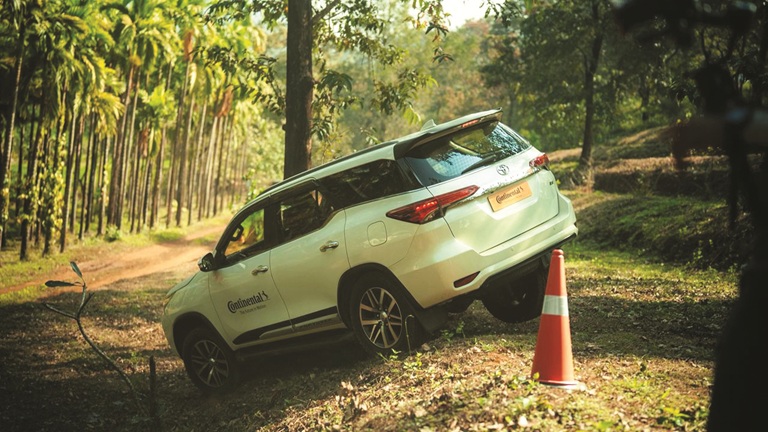
Despite these favourable structural trends, premium tyres have historically struggled to gain traction in India. For much of the past decade, the market remained intensely price-sensitive, with tyres treated largely as commoditised replacement items. Continental’s response, Gupta explains, has been consistent rather than tactical pricing. “Right from the beginning, we have focused on fair pricing. The idea is simple – if we can clearly differentiate on performance and consistently deliver on those promises, price recovery will follow,” he explains.
The broader environment is now becoming more supportive. As vehicle prices rise and consumers migrate towards larger, more sophisticated vehicles, willingness to spend on tyres that enhance safety, comfort and driving confidence is increasing. This trend is also evident at the top end of the market. Premium and luxury passenger vehicle sales reached approximately 51,500 units in 2024, up around 6 percent year on year and crossing the 50,000-unit threshold for the first time – a symbolic marker of premium consumption in India.
Gupta sees premiumisation extending beyond luxury vehicles. “Earlier, India was extremely price-sensitive, but that is changing in higher segments. Consumers are upgrading vehicles and are more willing to invest in tyres that enhance safety, comfort and confidence,” he says.
The intensification of competition, with global premium tyre brands expanding or re-entering India, is viewed as a positive development. “Competition is always good,” Gupta says. “It gives you room to grow and improve.” More importantly, he believes it will help reframe the market. “More premium players will help move the market away from being purely cost-driven to being value-driven,” he adds.
Replacement market dynamics reinforce this view. Of the roughly 32–33 million passenger tyres replaced annually in India, tyres sized 17 inches and above account for about 12–13 percent. While the overall replacement market grows at 5–6 percent per year, this high-diameter segment is expanding at over 20 percent annually, closely tracking the shift in new vehicle sales.
This sharper focus on passenger tyres also explains Continental’s decision to exit the truck and bus radial segment in India. Gupta stresses that the decision was strategic rather than operational. Continental entered the TBR market in 2014, invested significantly and received strong feedback on product performance.
However, the economics proved limiting. Gupta says, “TBR in India is largely a B2B, fit-for-purpose market. Even if you have the best tyre, willingness to pay remains limited because fleet operators are under constant margin pressure.” Although commercial tyres offer higher absolute margins per unit, they consume substantially more raw material. “One commercial tyre uses six to eight times the raw material of a car tyre. Percentage margins are actually higher in passenger tyres,” Gupta explains.
After reviewing its portfolio, Continental chose focus over breadth. Exiting TBR allows the company to concentrate capital, technology and management attention on passenger and light truck tyres, where differentiation is more readily monetised. Gupta rejects the idea that a narrower portfolio weakens the company’s position. Commercial and passenger tyre customers, he argues, are fundamentally different – one driven by procurement economics, the other by consumer perception and emotion.
Indian consumers, Gupta believes, are becoming more tyre-aware. “Premiumisation is happening across the vehicle industry, not just in tyres. As consumers move to larger and more premium cars, their expectations also rise,” he says. Where tyres were once treated as an afterthought, buyers increasingly recognise their role in braking, grip, noise and overall driving confidence.
This change is evident at the retail level. Continental now operates more than 200 brand stores across India, and feedback from retail partners suggests customers are more informed and more demanding. Availability remains critical. “There is no point launching premium tyres if customers cannot find them,” Gupta says.
To support future demand, Continental is investing around INR 1 billion at its Modipuram plant, with the focus squarely on passenger and light truck tyres. The expansion will extend manufacturing capability from the current 20-inch limit to 22–23 inches, aligning local production with emerging vehicle trends.
Localisation, Gupta argues, is about adaptation rather than compromise. Indian road conditions, climate and driving habits require specific tuning without diluting global performance standards. Education and availability remain the principal challenges.
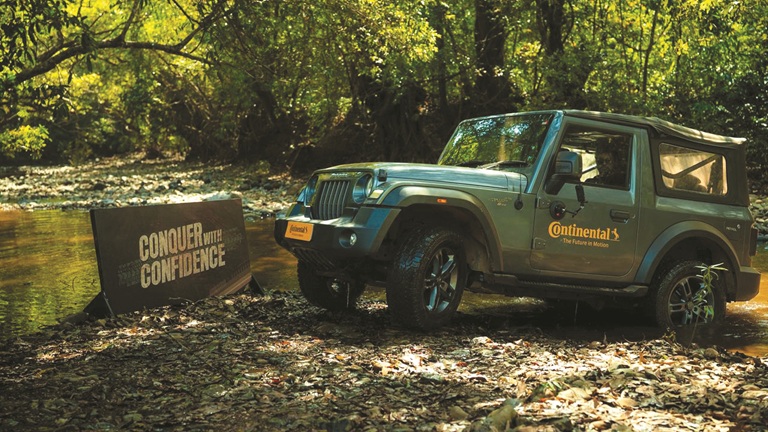
The recent launch of the CrossContact A/T² in India reflects this strategy. Introduced during Continental’s Track Day at Dot Goa 4x4, the product positions India among the early global markets for the tyre. “The first thing you notice is noise – or the lack of it,” Gupta says. “You hear the air-conditioning, not the tyre.” Ride comfort, grip and consistency across terrains define its appeal. As Gupta puts it, “Jahan tak soch jaati hai, wahan tak yeh tyre kaam karta hai.”
Looking ahead, Continental remains largely insulated from shifts in original equipment strategies, such as the gradual removal of spare tyres. Improved carcass design and stronger sidewalls are reducing puncture risk, but the company’s primary focus remains the replacement market.
For Gupta, the question is no longer whether India is ready for premium tyres, but how effectively manufacturers execute. “The market is finally ready for premium tyres,” he concludes. With passenger vehicle sales at record levels, SUVs firmly dominant and premium consumption expanding, Continental believes it is well positioned to grow alongside India’s evolving mobility landscape.
Falken Tyre Europe GmbH Rebrands As DUNLOP Tyre Europe GmbH
- By TT News
- February 26, 2026
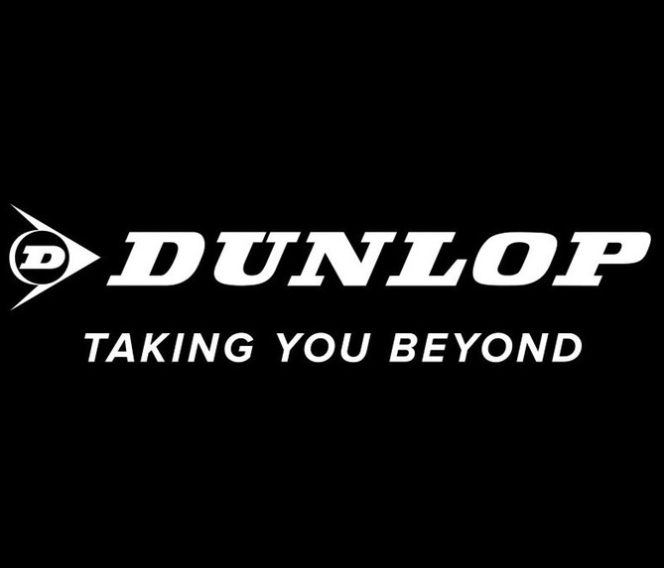
Falken Tyre Europe GmbH has officially transitioned to operating under the name DUNLOP Tyre Europe GmbH, following its formal registration with the Offenbach Local Court. This change signifies a pivotal development for the Sumitomo Rubber Industries subsidiary. The rebranding represents a calculated and essential move to establish a more formidable European footprint for the DUNLOP brand. Company leadership acknowledges that this evolution is built upon the considerable equity established by Falken, including its strong market recognition, unwavering product quality and the commitment of its personnel.
This strategic shift positions the organisation under the umbrella of a globally respected marque, with its future strategy firmly centred on expansion, pioneering advancements and ecological responsibility. A prominent symbol of this new chapter will be unveiled shortly, with the renaming of the DUNLOP City Tower in Offenbach. A formal ceremony will mark the occasion, featuring the presentation of the DUNLOP logo at the tower. The event is set to be attended by Offenbach's Lord Mayor, Dr Felix Schwenke, alongside the company’s managing directors, Hiroshi Hamada and Markus Bögner, and the newly enlarged DUNLOP team.
Markus Bögner, Managing Director and President, DUNLOP Tyre Europe GmbH, said, “The name change is an important milestone of which we can be very proud. It strengthens our identity and underlines that we are ready for the next steps. Our strong heritage with Falken is and remains part of our success, laying the foundations for DUNLOP’s future in Europe. Our thanks go to all our employees and partners who have supported and accompanied us on this journey.”







Comments (0)
ADD COMMENT